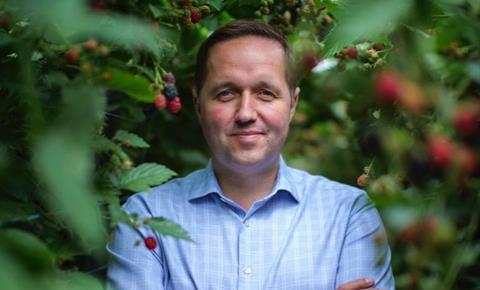The final panel of this year’s Festival of Fresh saw industry leaders talk tech innovation, productivity and profitability

FPJ’s annual Festival of Fresh was wrapped up with a panel discussion on progress towards net-zero targets, featuring industry leaders in sustainable fresh produce.
The event took place last week (13 June) on the pitch at Evesham United FC, in association with leading UK fruit and veg supplier Nationwide Produce.
The panel included NFU net-zero project delivery manager Kate Bannister, and Aethr Associates co-founder Richard Bonn, who tackled issues such as reducing emissions in the agriculture industry and its ongoing development towards full decarbonisation.
Government support, improving productivity and food security, and investing in new and sustainable technologies were seen as the biggest challenges towards net zero in the UK fresh produce sector.
Room for improvement
The speakers stressed that industry-wide efforts are needed to accelerate the journey to net-zero, and despite the progress that has already been made, there remains room for improvement.
However, measuring progress in reducing emissions is “very difficult,” according to Bannister.
She said: “We think there is high awareness for net zero and great interest in reducing emissions. Investments in things like renewable energy are crucial.
“One of our long-term ambitions with productivity improvements across the industry is reducing emissions by about 25 per cent. However, benchmarking progress is very difficult.”
As England and Wales have set the ambitious plan to reach net zero in the agriculture sector by 2040, the demand for updated government policy and support is starting to ramp up.
Bannister added: “We do need support, and that must come rapidly through government policy and throughout the supply chain. For us, we really want to see much more support with greenhouse gas reduction and broader productivity in agriculture. Things like tax breaks on low-carbon capital equipment and infrastructure would help.”
Bonn said that business leaders should have the impetus to understand their environmental impact as a starting point. He stressed that businesses need to ensure that any investment gets a payback, whether that’s in innovation or productivity, that will ultimately benefit their carbon footprint. “Then it’s about implementing the processes and systems to deliver on net-zero.”
Investment in new practices and technologies
Replying to a question on sustainability in UK farms and supply chains, Bonn emphasised that it is crucial to invest in sustainable practices and new technologies to reduce carbon footprint, increase profitability and improve productivity.
He spoke on the emergence of agri-tech and how fast it has developed over the last decade: “There are opportunities for business to adopt AI automations, robotics, and different levels of software such as satellite mapping.”
Furthermore, Bonn stressed that the businesses that will succeed over the next 20 years are the ones that will “execute extremely well and pick up on new innovations and deliver on them.” As a result, he said, “they will be more productive and more profitable in the long-term.”
Getting the balance right
The panellists spoke further on government support, noting that there is currently heavier emphasis on domestic production compared with environmental protection, of which there should usually be equal balance.
Bannister said that farmers “have always looked after the environment,” and that it’s “all about the most resilient businesses” in the future. Meanwhile, Bonn summed up by saying that in terms of a potential change in government, “there’s uncertainty around what policies will come.”
He added: “The food security strategy and the environmental strategy shouldn’t be seen as a binary choice between the two – the two should be compatible. This is because you can see how the environmental policy could conflict with food security going forward, where potentially, farmers can make more money from natural capital and biodiversity net-gain rather than producing food and farming.”



